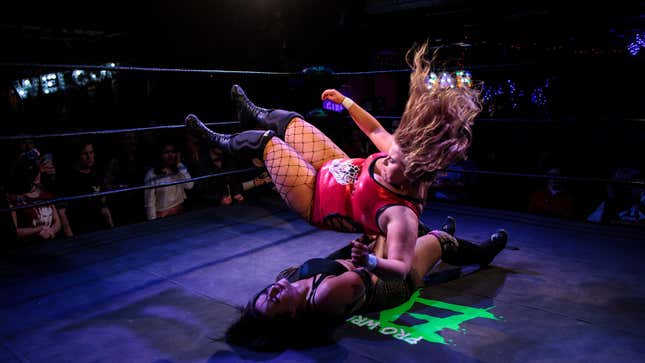Women Wrestlers Allege Years of Sexual Abuse and Misconduct in the Industry
Latest

Last week, #SpeakOut started trending on Twitter, as women wrestlers across the industry shared their experiences of sexual abuse and assault throughout their careers. Within a matter of days, women from wrestling companies big and small had accused almost a hundred men of some form of sexual assault, highlighting a problem that’s been hidden in plain sight for years. The tweets encompassed a variety of accusations, including grooming, rape, assault, and blackballing a woman’s career for not agreeing to commit a sexual act. RingSide News currently has a running list of most of the men who have been accused, but the site includes the caveat that because there are so many, it’s hard to keep the list as up to date as possible.
Some wrestlers who have been accused are currently facing punishment. Sammy Guevara, a performer with All Elite Wrestling, has been suspended without pay after a video of him surfaced saying that he would rape WWE Superstar Sasha Banks because he found her so attractive. Another wrestler, Jack Gallagher (real name Oliver Claffey), was released from the WWE after a woman shared her story about how Gallagher had allegedly gotten her drunk and assaulted her in a bathroom. Other performers who have been accused are undergoing investigations being lead by their respective companies which include WWE, All Elite Wrestling (AEW), Impact Wrestling, and National Wrestling Alliance.
Fans of professional wrestling know that there has always been a complicated relationship between fans, wrestlers, and wrestling promotions. Wrestling promotions like WWE are, by nature, exploitative of their wrestlers through their employment contracts and inhuman schedules. But wrestlers and fans are also locked in a strange symbiotic relationship that makes exploitation, stereotyping, and sexism profitable marketing tools.
It’s a known fact in the wrestling community that storylines and wrestlers live and die on what’s called “pop.” Pop is crowd reaction. If a wrestler comes out to a crowd full of boos, it’s still considered good pop because it signals that the crowd is invested in the character as a villain. In the early days of wrestling, the easiest way to get a villain pop was to make the wrestler into an Arab or southeast Asian stereotype such as the Great Khali, Muhammad Hussan, Jinder Mahal and early iterations of Mustafa Ali’s character. For years these characters got great fan interaction and thus were allowed to continue working within these racist constraints.
-

-

-

-

-

-

-

-

-

-

-

-

-

-

-

-

-

-

-

-

-

-

-

-

-

-

-

-

-

-

-

-

-

-

-

-

-

-

-

-








































